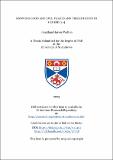Files in this item
Knowing good and evil : values and presentation in Genesis 2–4
Item metadata
| dc.contributor.advisor | Nevader, Madhavi | |
| dc.contributor.author | Walton, Jonathan Harvey | |
| dc.coverage.spatial | 195 | en_US |
| dc.date.accessioned | 2023-06-02T11:43:14Z | |
| dc.date.available | 2023-06-02T11:43:14Z | |
| dc.date.issued | 2023-11-29 | |
| dc.identifier.uri | https://hdl.handle.net/10023/27738 | |
| dc.description.abstract | This thesis argues that the theological interpretation of Genesis 2–4, which describes a pristine world corrupted by evil, derives from a cosmological model and accompanying ideas of what constitutes goodness and badness that is anachronistic to the original context of the Hebrew Bible and instead arises from the reception of the material in the Hellenistic period. By comparing ideas and images from ancient Near Eastern literature that resemble those appearing in Genesis, we argue that Genesis presents a cosmology and system of values wherein an eternally pre-existing undesirable state of negation (“chaos”) is pushed to the periphery of a manufactured desirable condition of order and harmony, which in turn is threatened by an undesirable corruption from within (“evil”) and thereby under constant threat of collapsing back into nothingness unless perpetually sustained by the combined efforts of humans and gods. Within this cosmology and axiology, which is shared with the literature of the ancient Near East, Genesis presents a subversive narrative that discusses where true order in the world might be found. We argue that the Primordial History provides a deconstruction of various institutions of order found throughout the rest of the ancient Near East, especially those favoured by Israel’s Babylonian conquerors, in order to promote the Israelite covenant with Yahweh as the desirable alternative. Each institution in turn is presented as valuable and useful yet also insufficient to produce and sustain order. The pericope of Genesis 2–4—"the account of the heavens and the earth”—deconstructs the institutions of agriculture and civilization, specifically by demonstrating that, in contrast to the presentation of comparative literature, their acquisition is insufficient to elevate humans out of a state of negation, and further demonstrating that the pursuit of cultural achievement is insufficient to produce the nearest possible human approximation of eternal life. | en_US |
| dc.language.iso | en | en_US |
| dc.subject | Genesis | en_US |
| dc.subject | Bible | en_US |
| dc.subject | Sin | en_US |
| dc.subject | Theodicy | en_US |
| dc.subject | Chaos | en_US |
| dc.subject | Mesopotamia | en_US |
| dc.subject | Babylon | en_US |
| dc.subject | Egypt | en_US |
| dc.subject | Gilgamesh | en_US |
| dc.subject | Atrahasis | en_US |
| dc.subject | Adapa | en_US |
| dc.subject | Theology | en_US |
| dc.subject | Covenant | en_US |
| dc.subject | Value | en_US |
| dc.subject | Axiology | en_US |
| dc.subject | Cosmology | en_US |
| dc.subject | Cosmogony | en_US |
| dc.subject | Anthropogony | en_US |
| dc.subject | Judaism | en_US |
| dc.subject | Hebrew | en_US |
| dc.subject | Dualism | en_US |
| dc.subject | Eden | en_US |
| dc.subject | Order | en_US |
| dc.subject | Adam | en_US |
| dc.subject | Eve | en_US |
| dc.subject | Cain | en_US |
| dc.subject | Chaoskampf | en_US |
| dc.subject | Good | en_US |
| dc.subject | Evil | en_US |
| dc.subject | Assyria | en_US |
| dc.subject | Hittite | en_US |
| dc.subject | Israel | en_US |
| dc.subject | Mythology | en_US |
| dc.subject.lcc | BS1235.52W26 | |
| dc.subject.lcsh | Bible. Genesis--Criticism, interpretation, etc. | en |
| dc.subject.lcsh | Sin--Christianity | en |
| dc.subject.lcsh | Theodicy | en |
| dc.subject.lcsh | Biblical cosmology | en |
| dc.title | Knowing good and evil : values and presentation in Genesis 2–4 | en_US |
| dc.type | Thesis | en_US |
| dc.type.qualificationlevel | Doctoral | en_US |
| dc.type.qualificationname | PhD Doctor of Philosophy | en_US |
| dc.publisher.institution | The University of St Andrews | en_US |
| dc.identifier.doi | https://doi.org/10.17630/sta/491 |
This item appears in the following Collection(s)
Items in the St Andrews Research Repository are protected by copyright, with all rights reserved, unless otherwise indicated.

